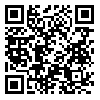Volume 15, Issue 5 (September-October 2016)
Payesh 2016, 15(5): 567-578 |
Back to browse issues page
Download citation:
BibTeX | RIS | EndNote | Medlars | ProCite | Reference Manager | RefWorks
Send citation to:



BibTeX | RIS | EndNote | Medlars | ProCite | Reference Manager | RefWorks
Send citation to:
Nahid Rejeh, Majideh Heravi-Karimooi, MMahshid Foroughan, Maryam Nikkhah, Bagheri Azam. The Persian version of Attitudes to Ageing Questionnaire (AAQ): a validation study. Payesh 2016; 15 (5) :567-578
URL: http://payeshjournal.ir/article-1-157-en.html
URL: http://payeshjournal.ir/article-1-157-en.html
1- Elderly Care Research Centre - Shahed University, College of Nursing & Midwifery, Tehran, Iran
2- Research, ACECR, Department of Gerontology, University of Social Welfare and Rehabilitation Sciences, Tehran, Iran
3- Faculty of Nursing and Midwifery, Shahed University, Tehran, Iran
4- Health Metrics Research Centre, Iranian Institute for Health Sciences Research, ACECR, Tehran, Iran
2- Research, ACECR, Department of Gerontology, University of Social Welfare and Rehabilitation Sciences, Tehran, Iran
3- Faculty of Nursing and Midwifery, Shahed University, Tehran, Iran
4- Health Metrics Research Centre, Iranian Institute for Health Sciences Research, ACECR, Tehran, Iran
Abstract: (8933 Views)
Objective (s): To translate and validate a Persian version of the AAQ in Iran. The AAQ consists of 24 items which cover three theoretical domains: physical change, psychological growth, and psychosocial loss.
Methods: The existing AAQ (English version) was translated into Persian according to process of translation and adaptation of instruments of The World Health Organization protocol. Data were then collected from 200 older people. Reliability (internal consistency, test- retest reliability) face validity, content validity, known-groups comparison and criterion validity of the AAQ, with the SF-36, and the WHOQOL, were examined.
Results: The mean age of participants was 67.66 ±6.28, and more than half (50.5%) were female. There was satisfactory internal consistency (Cronbach’s a 0.80–0.89) for the subscales. Test-retest reliability (ICC) of the questionnaire with interval time of two weeks was 0.97(p < 0.001). The result of known-groups comparison showed that the questionnaire discriminated between subgroups of elderly people differing in gender, and education. Criterion validity was assessed by comparing scores for the eight dimensions of the SF-36, four factors of the WHOQOL and four factors of the AAQ (Persian version). The AAQ showed significant correlation with SF-36, and WHOQOL in most dimensions.
Conclusion: We tested and validated a Persian version of the AAQ with 24 items. It appears to be a promising tool, providing reliable and valid data helping for measuring Attitudes to Ageing among elders in different settings such as clinics, homes and research environments. It is recommended in the future studies that structural validity of the Persian version AAQ in larger sample factor analysis be examined.
Methods: The existing AAQ (English version) was translated into Persian according to process of translation and adaptation of instruments of The World Health Organization protocol. Data were then collected from 200 older people. Reliability (internal consistency, test- retest reliability) face validity, content validity, known-groups comparison and criterion validity of the AAQ, with the SF-36, and the WHOQOL, were examined.
Results: The mean age of participants was 67.66 ±6.28, and more than half (50.5%) were female. There was satisfactory internal consistency (Cronbach’s a 0.80–0.89) for the subscales. Test-retest reliability (ICC) of the questionnaire with interval time of two weeks was 0.97(p < 0.001). The result of known-groups comparison showed that the questionnaire discriminated between subgroups of elderly people differing in gender, and education. Criterion validity was assessed by comparing scores for the eight dimensions of the SF-36, four factors of the WHOQOL and four factors of the AAQ (Persian version). The AAQ showed significant correlation with SF-36, and WHOQOL in most dimensions.
Conclusion: We tested and validated a Persian version of the AAQ with 24 items. It appears to be a promising tool, providing reliable and valid data helping for measuring Attitudes to Ageing among elders in different settings such as clinics, homes and research environments. It is recommended in the future studies that structural validity of the Persian version AAQ in larger sample factor analysis be examined.
type of study: Descriptive |
Accepted: 2015/10/12 | ePublished ahead of print: 2016/08/23 | Published: 2016/09/15
Accepted: 2015/10/12 | ePublished ahead of print: 2016/08/23 | Published: 2016/09/15
| Rights and Permissions | |
 |
This work is licensed under a Creative Commons Attribution-NonCommercial 4.0 International License. |





